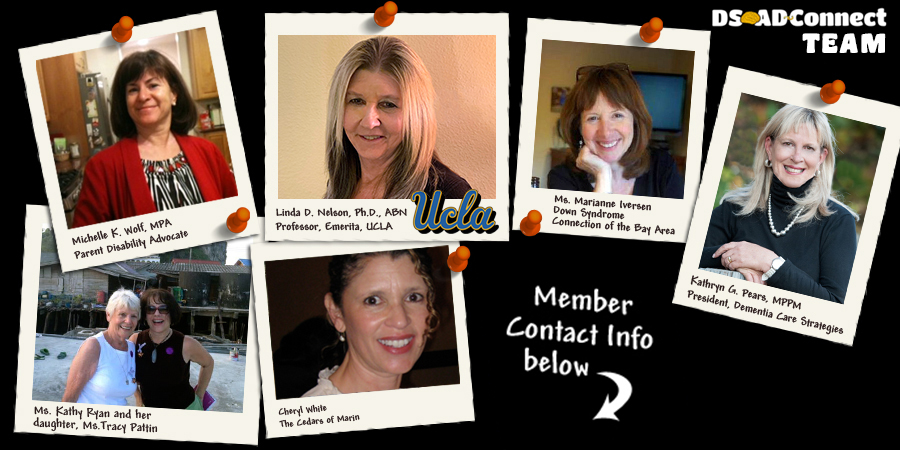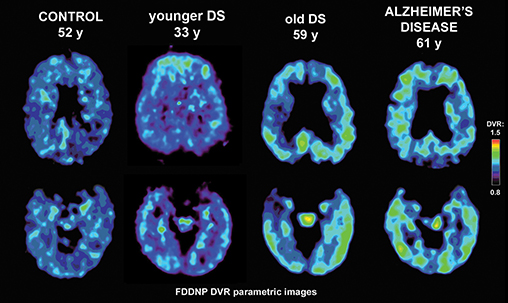

Ms. Michelle Wolf is Executive |
Linda D. Nelson, Ph.D., ABN Professor, Emerita, UCLA Intellectual and Developmental Research Center Department of Psychiatry and Biobehavioral Sciences Neuroscience Research Building 635 Charles E. Young, Dr., S, Ste. 375C Los Angeles, CA 90095 310-458-4581 |
Ms. Cheryl White, LMFT, |
|---|---|---|
Ms. Kathy Ryan and her daughter, |
Down Syndrome Connection of the Bay Area |
Kathryn G. Pears, MPPM, |
Student Board member: Psychology Department |
||
|
||
Mission Statement
The mission of ![]() is to educate, inform, and be advocates for, families and providers associated with the care and treatment of aging adults with Down syndrome. Our aim is to provide resources available for aging adults with Down syndrome and Alzheimer's disease in California. Together, we will work towards a goal of expanding programs, services, and supports.
is to educate, inform, and be advocates for, families and providers associated with the care and treatment of aging adults with Down syndrome. Our aim is to provide resources available for aging adults with Down syndrome and Alzheimer's disease in California. Together, we will work towards a goal of expanding programs, services, and supports.
![]() is here to help! You can always get to this page by going to DSADConnect.com!
is here to help! You can always get to this page by going to DSADConnect.com!
Down syndrome and Alzheimer's disease… THERE IS A CONNECTION.
Recent research shows that 75% of Individuals with Down syndrome will have been diagnosed with Alzheimer's disease after the age of 60 . DS/AD Connect is here to help you understand the impact of this diagnosis and to help you connect to the most current resources, information, and available supports.
Why DS/AD?
Individuals with Down syndrome are living much longer than ever before. This is unprecedented and, because of this, new discoveries have been and are continuing to be made about how individuals with Down syndrome age.
One very important, yet disheartening discovery, is that Down syndrome is a condition that places individuals at a very high risk for the early onset of Alzheimer's disease.
People with Down syndrome are born with an extra copy of Chromosome 21, that puts them at increased risk for early development of Alzheimer's disease. Alzheimer's symptoms tend to differ among those with Down syndrome than in the non- disabled population.
Do you suspect Alzheimer's?
Look for these signs:
- Changes in behavior
- Changes in mood or personality
- Changes in gait and coordination
- Changes in communication
- Late onset seizures
- Heightened irritability and frustration
- Agitation
- Getting stuck in familiar routines
- Difficulty performing routine tasks
- Social withdrawal
Early detection and treatment can improve the quality of life for the person diagnosed with Down syndrome and Alzheimer's disease. It can set the stage for good planning for the future.
Great Resources for Intellectually Disabled Individuals in Southern California:
- Bet Tzedek - Justice for all (L.A. county only): www.bettzedek.org
- DDS web page: www.dds.ca.gov
- Dr. Linda Nelson - UCLA: lpdnelson@outlook.com
- IDDRC: www.iddrc.ucla.edu
- Local Regionlpdnelson@outlook.comlpdnelson@outlook.comal Center information: www.dds.ca.gov/RC/RCLookup.cfm
- Medicare: www.medicare.gov
- National Down Syndrome Society: www.ndss.org
- National Task Group: http://aadmd.org/NTG
Helpful hints for families and caregivers of Alzheimer's patients with and without Down syndrome, from Millie in Wheaton, Illinois:
- Long-Distance Caregiving: How to Ensure Your Loved Ones are Safe at Home
- A Guide to Alzheimer’s Caregiving
- Understanding How Alzheimer’s Disease Changes People--Challenges and Coping Strategies
- Communicating with Alzheimer’s
- 8 Practical Tips to Help someone with Dementia to Eat More
- 7 Essential Coping Techniques for Alzheimer’s Caregiver Stress
- Helping Kids Cope When A Family Member Has Dementia
The Arc Los Angeles & Orange Counties
- The Arc's Center for Human Rights is a free service available to assist all families with challenging situations. Our focus is on families with a son or daughter with a developmental disability. Our team will sit down and discuss the obstacles a family faces and then uncover resources that are available to them. The end result is a plan to go forward. The Arc believes that these family need extra support and we are there to provide it.
- The Arc through the Center for Human Rights also collaborates with a number of agencies including IHSS and the Human Services Association to provide overall care.
- The Arc's Senior Services provides day services to Seniors with developmental disabilities. We have lowered the acceptance age to this program to 45 years old to adjust for the need of people with early onset of Alzheimer's. This is an active "on the go" program with the purpose of giving individuals a true early retirement experience.
Anyone looking for information on The Arc can reach Kevin MacDonald at arckmac@aol.com or through their website at www.TheArcLAOC.org.
Area Agency on Aging
There are two Area Agencies on Aging serving Los Angeles County's 88 cities and unincorporated areas. The City of Los Angeles is served by the Los Angeles Department of Aging. All others are served by the County of Los Angeles Department of Community and Senior Services. Both Departments are designated Area Agencies on Aging. AAA work with local community based organizations to provide a wide array of social, health promotion/prevention services such as health screenings, dining centers providing lunch, home delivered meals also knows as meals on wheels, transportation services, and much more.
All our services are for those 60 years and old, and caregiver supports for 18 and older for family caregiver of an older adult 60+. We encourage those in need to call as we can help navigate other community services. We work very closely with Independent Living Centers. For those who are younger than 60 years, we recommend reaching out to the Alzheimer's Association.
(800) 510-2020 is a statewide number for California's Area Agencies on Aging. You will automatically be routed to the nearest agency.
AT UCLA:
 [Fig.] Nelson LD, Siddarth P, Kepe V, Scheibel KE, Huang S-C, Barrio JR, Small GW © 2011
[Fig.] Nelson LD, Siddarth P, Kepe V, Scheibel KE, Huang S-C, Barrio JR, Small GW © 2011
PET of brain amyloid and tau in adults with Down syndrome. Archives of Neurology, 68(6), 768-774: "Strong age effects on [F-18]FDDNP PET binding levels by brain region were demonstrated in DS subjects: frontal, rs = .46, p = .04; parietal, rs = .57, p = .009; medial temporal, rs = .43. p = .05; and lateral temporal, rs = .72, p = .0003. [F-18]FDDNP PET binding levels in posterior cingulate were not significantly associated with age.
Brain scan identifies signs of Alzheimer's disease in adults with Down syndrome
By Linda Nelson, Ph.D., Principal Investigator, UCLA
In one of the first studies of its kind, UCLA researchers used a unique brain scan to assess the levels of amyloid plaques and neurofibrillary tangles – the hallmarks of Alzheimer's disease – in adults with Down syndrome. Published in the June edition of the Archives of Neurology, the finding may offer an additional clinical tool to help detect dementia in adults with Down syndrome, a genetic disorder caused by the presence of a complete or partial extra copy of chromosome 21. This study is based in northern and southern California and was supported by the National Institutes of Health (NIH), National Down Syndrome Society and the UCLA Academic Senate.
For more information, contact Dr. Nelson at lpdnelson@outlook.com.
Main Contact: Dr. Linda Nelson, 310-458-4581

